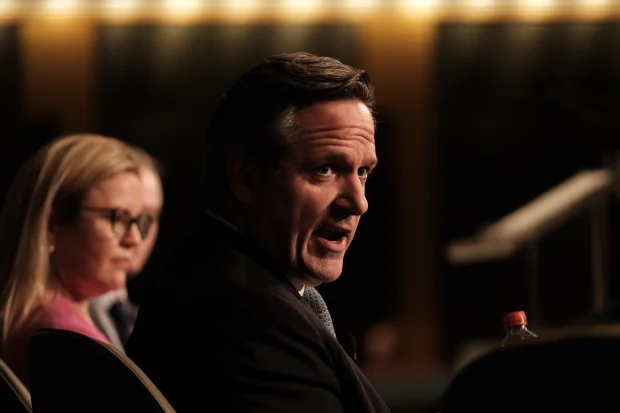
Article by Angela Macdonald-Smith courtesy of the Australian Financial Review.

A large gas sale struck between Senex Energy and AGL Energy will provide a critical test for the Albanese government’s new price controls on east coast gas, with the future of the $1 billion Atlas project at the heart of the deal dependent upon the rules being workable.
The deal – for the supply of more than 10 per cent of the reserves of the stalled Atlas expansion project in southern Queensland – remains conditional on the details of Labor’s mandatory code of conduct on gas. The final text of the code will only be released in about three weeks’ time.
Senex CEO Ian Davies said the deal would add critical new supply to the domestic market. Oscar Colman
It also hinges on the timely federal environmental clearance for the gas project, where a full approvals process has been ongoing since last year when Senex’s request for an exemption to the Environment Protection and Biodiversity Conservation Act was rejected by Environment Minister Tanya Plibersek.
The Australian Financial Review understands that Senex, owned by South Korean steel giant Posco and Gina Rinehart’s Hancock Energy, requires all approvals in the coming few months to be able to start delivering gas to AGL in January 2025.
The AGL deal involves up to 42 petajoules of gas from Atlas to be supplied over the rest of the decade. It is the biggest signed by Senex and the first for the Atlas expansion, with several other customers thought to be lining up to sign smaller deals.
Senex’s Atlas expansion in the Surat Basin is the highest profile project that was put on ice after the Albanese government slapped temporary price caps on east coast gas in December and proposed ongoing price controls.
Although the government has backflipped on the harshest elements of its original proposal and introduced exemptions to the now-ongoing $12-a-gigajoule price cap, producers are waiting to see the final version of the code before resuming investments in new supply.
Investment confidence
Samantha McCulloch, head of the gas industry lobby group APPEA, said on Wednesday the number one test of the code would be whether it “delivers the confidence producers need to make the urgent investment in new gas supply”. Both the Australian Energy Market Operator and the Australian Competition and Consumer Commission have advised of the need for investment in new gas to head off shortages in south-eastern states.
Senex chief executive Ian Davies said the company could only restart work on Atlas once it had certainty it could work with the new rules.
“We are cautiously optimistic that the final version of the code will be workable, and the exemption will follow,” he said. “We have no reason to doubt that will work for us, but we still need to see the detail.”
The government’s market intervention essentially stopped any new contracting and sales of gas on the east coast, raising doubts about future supply volumes despite warnings of looming shortages. Some smaller manufacturers have been unable to secure new contracts for gas through their retailer and have been stranded on temporary supply arrangements at high prices.
Mr Davies said Australian energy customers would benefit from the additional supply to the domestic market represented by the agreement with AGL.
The issue of gas supply for AGL, one of the country’s biggest electricity and gas retailers, is expected to be a topic for discussion at AGL’s investor briefing in Melbourne on Friday.
“During this cost-of-living crunch, one certain way to put downward pressure on prices for energy customers is to deliver new gas supply to market – and our domestically-focused Atlas expansion can do just that,” Mr Davies said.
He declined to comment on the pricing of the AGL deal, other than saying it was “reasonable”.
However, industry sources said they expected the price to be roughly about the level of the $12 cap, despite Senex’s exemption from that control.
Senex is still waiting on federal approvals for Atlas under the EPBC Act, despite the acreage it acquired for the expansion from the Australia Pacific LNG venture in late 2021 having previously been approved for coal seam gas extraction.
The company had sought clearance to develop the expanded project outside the full federal approvals process, but Ms Plibersek decided last August that an exemption was not “in the national interest”.
“The new gas deal between Senex and AGL and the commencement of gas supply in 2025 is conditional only on the timely recommencement of Senex’s Atlas expansion which was put on hold in December 2022 following government intervention in the gas market,” Senex said in a statement.
“Project recommencement requires the satisfactory resolution of regulatory arrangements and the receipt of certain Commonwealth approvals.”
Gas producers that supply the domestic market will be allowed to charge above the cap, in a potential win for the industry that warned of an investment freeze.















